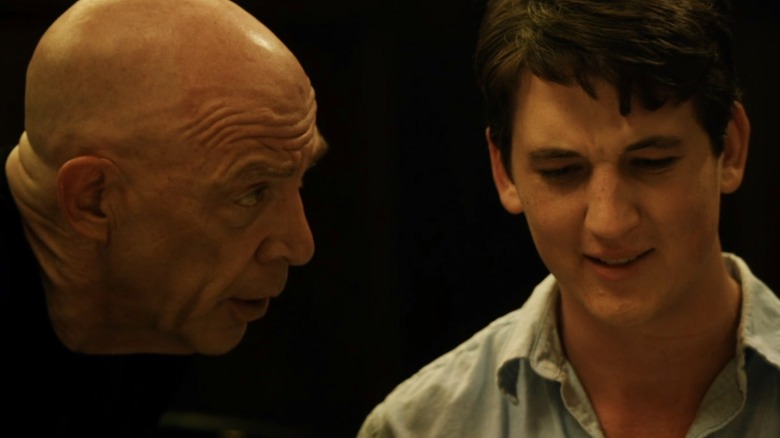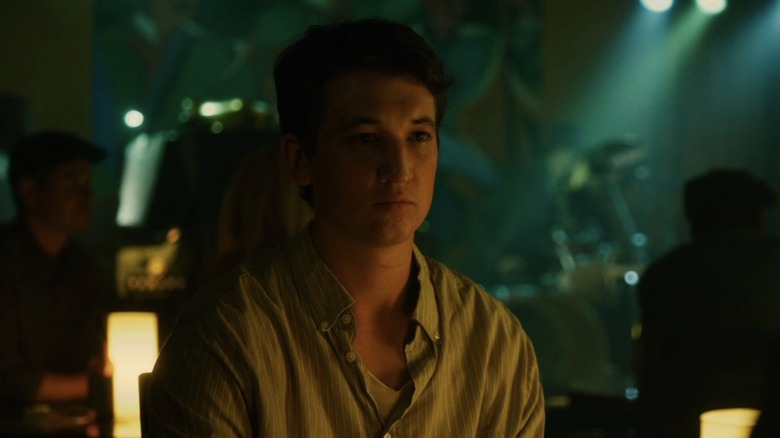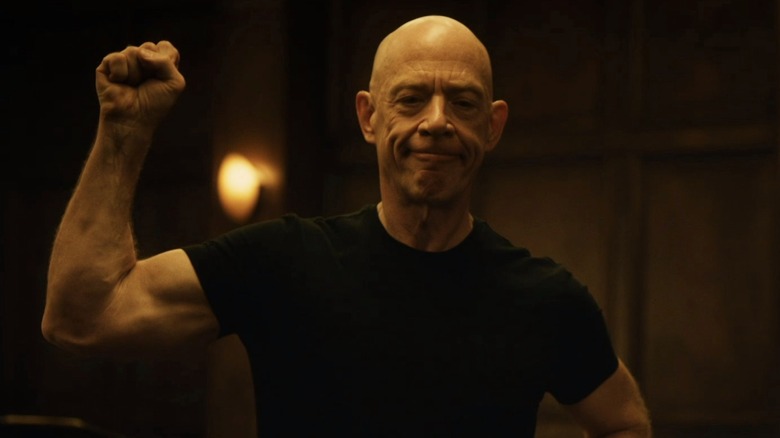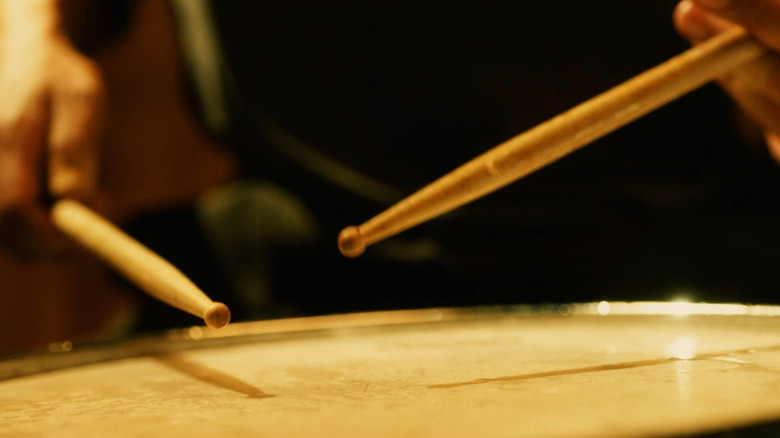Whiplash Ending Explained: On Stage With The Monster Of Perfectionism
On one level, Damien Chazelle's "Whiplash" is a story of an abusive relationship between a driven young student and a music teacher from hell. Terence Fletcher (J.K. Simmons in an Oscar-winning role) physically, verbally, and mentally abuses his students. It's all right there on the surface and cannot be condoned. In a classroom about as far removed from a safe space as you can get, Fletcher throws a chair at drummer Andrew Neiman (Miles Teller), repeatedly slaps him in the face, and calls him the worst things imaginable.
That's just one session. It's almost cartoonish how awful Fletcher is, as if the movie wants you to laugh along a little with some of his lines. Yet there's no denying that this guy, the supposed adult in the room, is a harasser and bully who berates college kids and humiliates them—to the point where it's implied that he even drove one of his former students to suicide offscreen.
Which is what makes the ending of "Whiplash" so discomfiting. It's one of those endings where the viewer might be left thinking, "What was the intent? How am I supposed to feel?"
While promoting the movie in 2014, Chazelle discussed his view of the ending and what happens afterward, but like any good film, "Whiplash" plays on more than one level. For some creative people or just people who are hard on themselves or meticulous in nature (a director like David Fincher, known for shooting as many as 200 takes of a single scene, comes to mind), Fletcher could also be seen as a manifestation of one's harsh inner critic.
To elaborate, we'll need to drum up some specifics here with spoilers. Consider this your count off for those, in a-one and a-two and a-three and a-four...
Mastery through monstrosity
As "Whiplash" heads into its third act, Andrew has been pushed to the breaking point, expelled from music school after getting in a car accident and having a violent confrontation with Fletcher onstage. He agrees to provide testimony leading to Fletcher's dismissal from the Schaffer Conservatory and then tries to reconnect with his ex-girlfriend Nicole (Melissa Benoist). Their relationship had become a casualty of his all-consuming ambition since he felt it would be an obstacle to his success, but she has moved on with her life and now has a new boyfriend.
When Andrew wanders into a nightclub where Fletcher is performing as a pianist with a jazz group, the one-time student and instructor wind up having a sit-down where Fletcher lays out his (as he sees it, misinterpreted) teaching philosophy. "I don't think people understood what it was I was doing at Schaffer," Fletcher says. He maintains that he "wasn't there to conduct" but to "push people beyond what's expected of them."
In his own mind, Fletcher believes in excellence and doesn't believe in "depriving the world" of the next great musician. He thinks his ruthless treatment of students like Andrew was justified on the grounds that it kept them constantly on their toes—the alternative being that they might relax and settle for mediocrity instead of giving their absolute best. "There are no two words in the English language more harmful than 'good job,'" Fletcher opines.
Andrew questions aloud whether there's a line Fletcher may have crossed, actively discouraging his students rather than encouraging them to be their best. You can see him getting drawn back into the same abusive relationship with Fletcher, but maybe he's also engaging with a part of himself in the form of this monstrous mentor of his.
Perfectionism Personified
Early in "Whiplash," we see how Fletcher — head clean-shaven, T-shirt plain black — runs the Schaffer Conservatory Studio Band like an army unit. As the military saying goes: the "s*** rolls downhill," with the students taking up Fletcher's combativeness with each other and even their own families, in Andrew's case.
Even when Fletcher plays nice, he's just conducting espionage so he can weaponize Andrew's family history against him later. All his students stand at attention like soldiers, the room silent and tense, everyone waiting on a hand flicker from the drill sergeant before they launch into a song.
What they're really readying for is psychological warfare. This is an old movie trick: putting the protagonist's inner life, their psychology, out in the open through drama, since we can't absorb what's going on in their mind the way we would if this were a book with first-person narration. Supporting characters act as foils for the main character, and Fletcher can be seen as one of those, too. Within the context of "Whiplash" as a psychodrama, he's the personification of perfectionism.
If you think of Fletcher this way, his scenes with Andrew take on a different dimension. Note how we see the second hand ticking on the classroom clock; Fletcher walks in the door at nine o'clock on the dot. His famous line, "Not quite my tempo," and obsession with the minutiae of Andrew's drum performance — how the kid's rushing or "dragging just a hair" — are all part of his perfectionist schtick.
Fletcher is unforgiving of the slightest flaw or failure in music. He's like the sniper in "Grand Piano" (Chazelle's last produced screenplay before "Whiplash"), which stars Elijah Wood as a pianist who has a gun trained on him, ready to shoot him if he plays one wrong note onstage.
'I'll cue you'
Fletcher runs his students ragged and expects them to be thick-skinned, but the camera also frames him in a two-shot as the voice in Andrew's ear, exploiting his tears or any sign of weakness to browbeat him further. By telling Andrew he's not good enough and never will be, he awakens his spirit of defiance, the part of Andrew that wants to prove his uncle, aunt, and MVP and Rhodes Scholar cousins wrong about his unrecognized, perhaps undeveloped, talent.
Andrew describes Schaffer as the country's best music school. He's among world-class college musicians and wants to be "one of the greats," but he doesn't necessarily have what it takes at the start. Sometimes he's careless, oversleeping and losing an important sheet music book. At the same time, he refuses to end up like his father Jim (Paul Reiser), a failed writer who's "more of a teacher."
To achieve greatness, Andrew practices drumming until his hands are bloody—even when Fletcher's not around. Dedication turns to obsession, and self-destruction follows, while even the most diligent perfectionist runs up against forces they can't control, as we see when Andrew's bus breaks down en route to a performance.
Fletcher threatens Andrew not to "deliberately sabotage" his band, but then he turns around and does that very thing to Andrew at the end of "Whiplash." He blindsides Andrew onstage with a song he doesn't know, but Andrew is able to retake the stage, surrender to spontaneity, and take control of the band from Fletcher with the words, "I'll cue you."
As he improvises an epic drum solo, they enjoy a smiling truce. Rigid perfectionism is now subordinate to fluid artistry, but blood is still dripping from the cymbals and Andrew may yet crash and burn.



